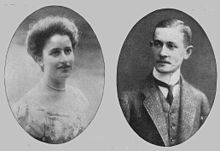Barbara Krupp
Barbara Krupp , married von Wilmowsky (born September 25, 1887 in Essen ; died September 30, 1972 in Essen- Bredeney ) was the second daughter of the industrialist Friedrich Alfred Krupp .
Life
Barbara Krupp was the younger daughter of the Essen industrialist Friedrich Alfred Krupp and Margarethe Krupp , née Freiin von Ende, and sister of the later sole heir of the Krupp concern Bertha Krupp . Barbara spent her youth at the Villa Hügel in Essen , built by her grandfather, the steel industrialist Alfred Krupp .
On May 7, 1907, Barbara Krupp married Tilo Freiherr von Wilmowsky , an administrative lawyer and son of the President of the Province of Schleswig-Holstein and former head of the Reich Chancellery Kurt von Wilmowsky, in the Villa Hügel . The marriage had six children: Ursula (1908–1975), Friedrich (1911–1988), Renate (* 1914), Kurt (1916–1940, killed in the war ), Brigitte (1918–2006) and Reinhild (1925– 2011).
The von Wilmowski family lived at Marienthal Castle near Eckartsberga in the province of Saxony , the von Wilmowskys estate, which had been owned by the family since 1893 and was rebuilt in 1910 by the architect Paul Schultze-Naumburg . Tilo managed the estate, was chairman of the federal government and, among other things, a member of the provincial parliament of the province of Saxony.
After the attempt on Hitler on 20 July 1944 Barbara and Tilo of Wilmowsky were from the Gestapo to actual basis of private and business contacts or alleged "conspirators" as Carl Goerdeler , John Popitz , Ulrich von Hassell and Ewald solver , arrested separately and charged. Barbara was taken to the Halle women's prison . A domestic worker said that on July 17th, a few days before the attack, Barbara said: "If Hitler dies tomorrow, all of Germany will be happy". However, this statement has been revoked. Apparently the influence of Alfried Krupp von Bohlen and Halbach was still sufficient to stop the Nazi justice system in their case. She was released before Christmas and was acquitted in January 1945 for degrading military strength . Her husband Tilo was also not directly involved in the attack. Nevertheless, he was transferred to the Ravensbrück concentration camp . He survived the death march from there to Schwerin .

After the end of the war, the couple initially tried to keep the Marienthal estate, but after the region was handed over by the Americans to the Soviet occupation , political pressure increased enormously, so that they were expropriated as part of the land reform due to the size of the agricultural property of over 100 hectares and were expelled. They first came to the Buchenau Forest Estate near Bad Hersfeld . Later they lived in a generously converted former goalkeeper's house in the Hügelpark in Essen. Barbara Krupp was the last Krupp and the last member of the family to live in the area of Villa Hügel, which is now open to the public.
Barbara's husband held a supervisory board position at Friedrich Krupp AG until 1943 and was also a member of the Krupp board of directors after the war. Until his death he had a seat on the family council. Barbara Krupp was buried in the family cemetery of the Krupp family in Essen-Bredeney.
Honors
The Friedrich Krupp AG Grusonwerk was located in Magdeburg , so that Barbarastraße was named after it there in 1911 (today: Louis-Braille-Straße).
granddaughter
Barbara von Wilmowsky's granddaughter Barbara Rogers took part in a project in 2001 in which she reflected on the aftermath of life's lies in the Krupp family about forced labor and the Holocaust .
Individual evidence
- ↑ The origin. In: schloss-marienthal.de. Retrieved June 10, 2011 .
- ↑ Wilmowsky, retrospect, p. 222.
- ↑ Alfried, like his father, came up with the name "Krupp von Bohlen und Halbach" through Wilhelm II. The son Arndt von Bohlen und Halbach no longer had the name "Krupp".
- ↑ Barbara Rogers: Encounter with a wall of silence. In: Naomi Berger; Alan L. Berger (Ed.): Second generation voices: reflections by children of Holocaust survivors and perpetrators . Syracuse, NY: Syracuse University Press, 2001 online (Engl.)
| personal data | |
|---|---|
| SURNAME | Krupp, Barbara |
| ALTERNATIVE NAMES | Wilmowsky, Barbara von |
| BRIEF DESCRIPTION | German industrialists |
| DATE OF BIRTH | September 25, 1887 |
| PLACE OF BIRTH | eat |
| DATE OF DEATH | September 30, 1972 |
| Place of death | eat |

